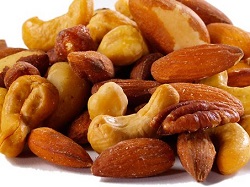The Cost of Organic Food: Is It Worth It?
 Although the benefits aren’t black and white when it comes to justifying the extra cost of organic food, it’s clear that people are willing to pay more for it. According to the Nutrition Business Journal, organic food sales by U.S. consumers rose from $11 billion in 2004 to an estimated $27 billion in 2012. This jump reflects the growing consumer demand for healthier, safer, and more eco-friendly alternatives to conventional food products. Buying organic food products is a very personal choice that comes with multiple considerations.
Although the benefits aren’t black and white when it comes to justifying the extra cost of organic food, it’s clear that people are willing to pay more for it. According to the Nutrition Business Journal, organic food sales by U.S. consumers rose from $11 billion in 2004 to an estimated $27 billion in 2012. This jump reflects the growing consumer demand for healthier, safer, and more eco-friendly alternatives to conventional food products. Buying organic food products is a very personal choice that comes with multiple considerations.
Organic Food: Nutrition and Safety
One of the main reasons people are willing to pay the extra cost of organic food is because of a perception that it’s healthier, safer, and better for the environment than conventional food. The emphasis on renewable resources and the absence of synthetic pesticides and irradiation used in conventional farming methods contribute to these beliefs. Does organic food contain more vitamins and minerals than its conventional counterparts? Do less pesticides lower our risk for health problems?
Stanford University researchers conducted a meta-analysis of 240 studies to compare the nutrient and contaminant levels in conventional food to those in organic food. They concluded that although there is no substantial evidence that organic foods are more nutritious than conventional foods, organic produce appeared to have 30% lower pesticide residues than conventional produce.
But aren’t conventional foods just as safe as organic foods? After all, both the Environmental Protection Agency (EPA) and individual states regulate the sale, distribution, and use of pesticides in the United States to ensure that pesticide use does not pose unreasonable health risks to people and the environment. However, for those concerned with pesticide levels, choosing organic food is a safer bet since production is managed without the use of synthetic pesticides and regulated closely by the USDA to ensure this.
Organic Food: The Environment
Another reason consumers are willing to validate the cost of organic food is concern for the earth’s resources. Organic food advocates believe that organic farming is actually better for the environment than large-scale commercial farming practices. Are organic farming practices really less harmful and more eco-friendly than conventional methods? There are several factors to consider when comparing the environmental impact of each practice.
A study published by researchers from Canada’s McGill University and the U.S.’s University of Minnesota in the science journal Nature found that organic yields are typically lower than conventional yields. However, it is important to consider this on a case-by-case basis since this conclusion is highly dependent on the specific crops and site characteristics. When it comes to understanding the environmental impact of organic and conventional farming practices, land use is just one topic to consider. Organic farming has a greater focus on the use of renewable resources and the conservation of soil and water. Conventional farming practices face the problem of chemical run-off from nitrogen-rich fertilizers. This depletes the level of oxygen in the water system, leading to “dead zones” where marine ecosystems can no longer be sustained.
 When all things are considered, it’s hard to say that one farming practice is better than the other.
When all things are considered, it’s hard to say that one farming practice is better than the other.
There is still considerable uncertainty and debate over the benefits of organic food. When it comes down to it, making the switch to buy organic food is truly a personal decision.
At Nuts.com, all of our organic products have earned the organic certification of the California Certified Organic Farmers (CCOF) certifying agency, in addition to meeting requirements by the USDA. Our line of certified organic food products is your assurance that they have been grown and handled according to the strictest procedures available.

Leave a Reply